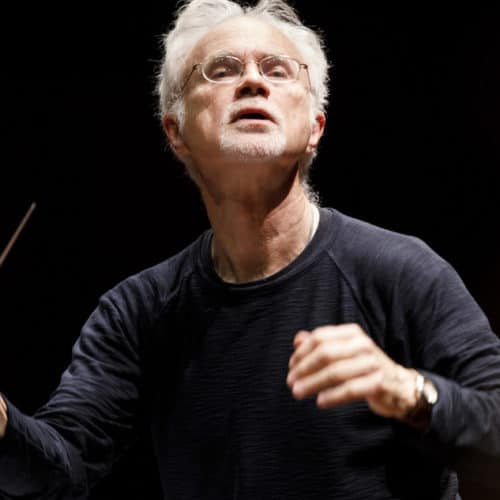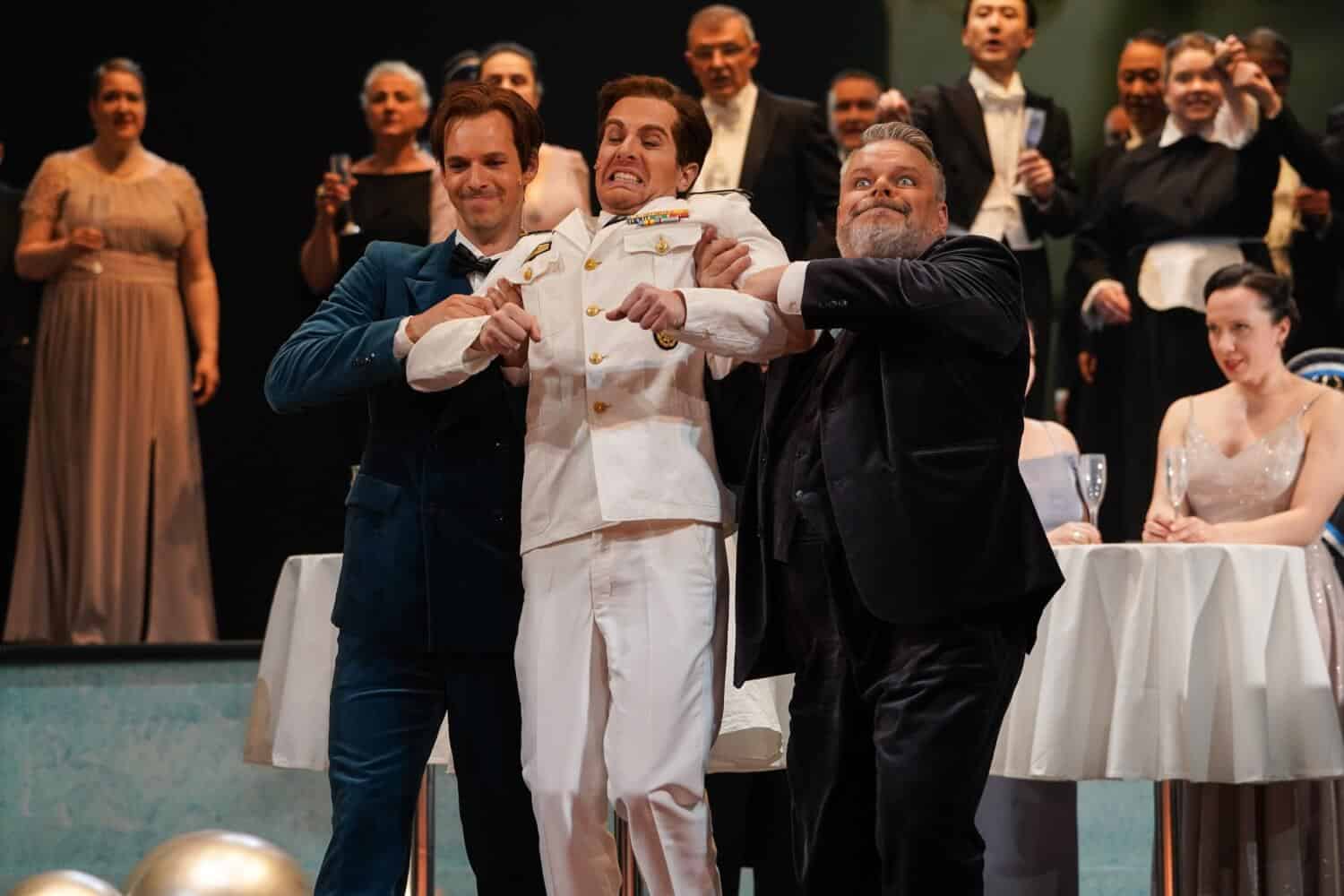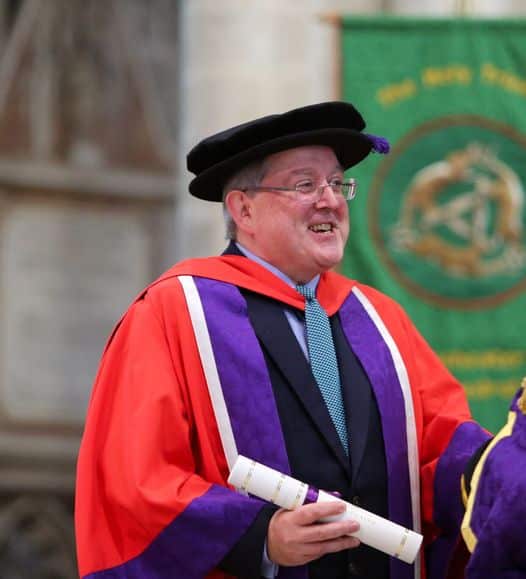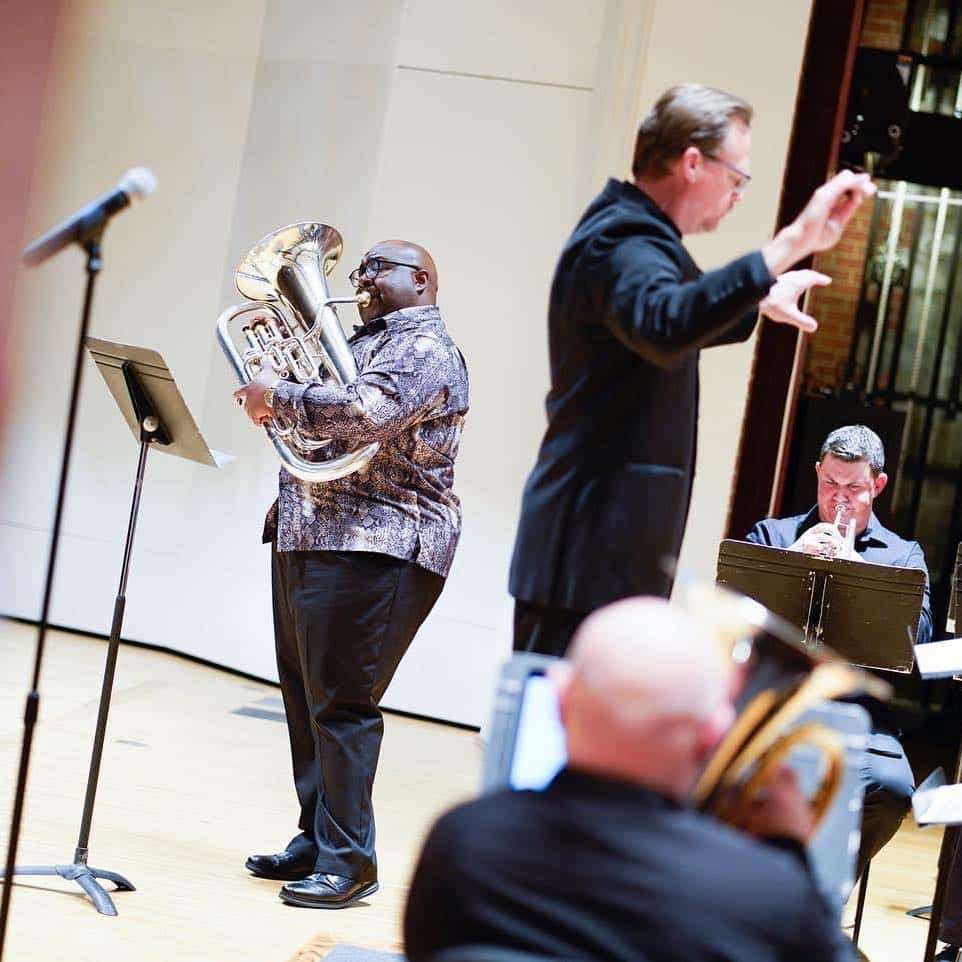What do composers earn in commissions? Often $00.00
mainA survey of composer incomes reported by NewMusicBox expose a bleak landscape.
Out of 871 US commissions examing, 37 percent paid the composer precisely nothing.
The media fee was $1,500.
At the top end, an opera was commissioned for $300,000.
Read here.







The best piece of advice I was given when starting out was “never work for nothing”.
That’s not “media fee” but “median fee”. Anyway…I have to wonder what’s the point of commissions anymore? Too often a commissioned work receives its premiere and its final performance the same evening. It seems composing talent has vanished. Modern composers are unable to reach audiences. They write music that is boring for the musicians and pointless to conductors who in the back of their minds are looking forward to the upcoming Tchaikovsky symphony they can show off with. The best commissioned music (if that’s the correct term) is being written for the movies.
Sure, we remember the greats from 200 years ago. But for every Beethoven symphony, how many symphonies written at the same time were performed exactly once and forgotten? Even many of the great composers have works that they themselves refused to (re)publish.
Think of it as books. Some literary works will be published, read modestly, and disappear. And for every Margaret Atwood, Gabriel Garcia Marquez, etc., there’s a ton of decent books which will live on for a literary season and not get reprinted. You can’t expect timeless classics every time a work gets published.
So yeah, some premieres will be bad. Some will be good, but not last. Some will be great and vanish. And some will endure. And often it’s hard to know in advance which will be which.
“The best commissioned music (if that’s the correct term) is being written for the movies.”
Because (for the most part) its reminds you of music you already know and love. Film composers are usually skilled dramatists/ craftsmen but not inherently all that compelling on their own terms.
Try and be a bit more adventurous in your listening habits. There *is* an audience for the music of today. While the majority will slip into permanent obscurity some of it won’t.
Yup. Once and done is pretty much the rule.
I recall one composer saying that the only thing harder than getting a piece performed for the first time was… getting it performed a second time.
There is a bit of truth to what you’re saying, but some pieces that have been commissioned and performed regularly also come from church choirs who commission composers to write anything from a small-scale motet to a large-scale anthem requiring brass ensemble, organ and percussion. You don’t hear much about this because pieces like this only stay within the realm of the church. Rare do some of these works make it to the concert hall.
On the other hand you have a lot of exciting concert music composed for concert band and wind ensemble, but because most classical music lovers are weaned on hearing a symphony orchestra, they take band music for granted. Many people expect band music to be tepid, overblown and simply pompous, an assortment of marches, arrangements and medleys of popular songs, inferior transcriptions of orchestral works and insignificant original works that simply don’t stand up against their counterparts who primarily compose for orchestra.
That said, there are works like Dan Forrest’s Requiem for the Living, James Barnes’ third and fifth symphonies, John Mackey’s Harvest, Morton Lauridsen’s Lux Aeterna and John Rutter’s Mass for the Children that have been successful with audiences and musicians alike, but you won’t hear much about them because major conductors won’t program these pieces. It’s amazing that a work like Herbert Howell’s Hymnus Paradisi, written in the same decade as Walton’s Belshazzar’s Feast, doesn’t get heard much in the States as most choral societies program the umpteenth performance of Carmina Burana (yes, it sells tickets, but…)
Perhaps it’s time for audiences to seek works that they might like, even though I feel that many of the works that they don’t like are very important works in the continuing evolution of classical music.
By the oddest and happiest of coincidences, this post has appeared just as I am listening to John Adams’s utterly excellent recording of his utterly excellent Son of Chamber Symphony, which was “commissioned for Stanford Lively Arts in honor of the Bonnie J. Addario Lung Cancer Foundation during Lung Cancer Awareness Month, November 2007, with generous support from Van and Eddie Van Auken, and by The Carnegie Hall Corporation, and made possible in part by The Swanson Foundation in honor of San Francisco Ballet’s 75th Anniversary.” Quite a mouthful, eh? The cd is a joy, and I hope this delightful and uplifting work will continue to be performed live and in person, forever casting shared glory on Mr. Adams’s benefactors, modern day equivalents of “the Magnificent” Prince Esterhazy.
‘Son of Chamber Symphony’ was inspired, if that is the word, by Schoenberg’s First Chamber Symphony which is quite tense and very busy music. Adams said about the Schoenberg that what he heard in it, is mainly ‘speed’, so he laid it thick on in his ‘son’. It is a case of Freudian protest against the father figure, since the Schoenberg is not at all ‘about’ speed.
https://www.youtube.com/watch?v=m_hMVzPT9f4
https://www.youtube.com/watch?v=5-lbiGpUfH4
Adams’s notes accompanying the CD state that the piece is the “son” of his own Chamber Symphony from 1992, and it is NOT the “son” of the Schoenberg.
He also goes on to say both of his works were inspired by the form of Schoenberg Op. 9 Chamber Symphony and its “explosive energy and the staggering, acrobatic virtuosity of its instrumental writing.”
So I don’t know where this “Freudian protest” stuff comes from. I perceive no protest, only veneration and affection.
Thanks for the correction. My memory of A”s saying was not checked.
What I meant with Freudian protest is that the Adams pieces sound like satire after you have carefully listened to the Schoenberg work, and again to the Schoenberg work after you have recovered from its dense sound world, and begin to perceive the passionate romanticism, its subtle tonal complexities and its masterly form.
Oh yes, agreed! The Schoenberg and the two Adams’s are all delightful frolics. And I will also say that I find the Schoenberg rather satirical to begin with. To get back on topic, I wonder if Schoenberg had a raft of sponsors, like Adams did.
Schoenberg struggled all his life with money problems, which he tried to solve with teaching.
For ONCE, you are wrong, Mr. Bortslap. “Chamber Symphony” is based on Schoenberg and is a fun, if overplayed, piece. “Son of Chamber Symphony” first mvmt. takes SOME inspiration from the rhythm of the fast section in mvmt 1 of Beethoven Sym 7, but otherwise it’s a watered down and boring piece that was rushed to completion, and sounds that way. It’s a completely inferior work to Chamber Symphony, and even after having performed it numerous times, including under the composers baton, I still find it pretty boring by Adams standards.
(How happy you must be with your observation…. ‘for once….’ Mind your spelling though, next time.)
Here is Adams’ ‘Chamber Symphony’.
https://www.youtube.com/watch?v=KNqGLYWX4Bo
Brilliant satire of Schoenberg, it’s hilarious.
“Bortslap”. I hadn’t noticed. I like that.
Maybe it was an on-purpose mistake ;))
Freud is still alive.
Sometimes composers have to PAY for getting a commission. But that is kept secret, of course, nobody knows about this wide-spread practice.
I didn’t know this. Can you elaborate? How does this work?
It often goes like this:
A composer – he may be well-known or not, and anything in between – visits the director of an orchestra at home. To find-out the home’s location takes ca. one year of effort. The quickest way to get in is through the window in summer time and at night. He forces the man out of his bed, without waking-up his wife, and takes him to the kitchen where he makes some mint tea and straps the man, who is still a bit dizzy because he had to listen to Mahler 8 the night before, on a chair. He shows him his last score and promises that a commission by the orchestra would be as bad as this one, and be entirely up-to-date according to the latest standards of the party line. He then puts his saved money of the last 5 years on the table, which has to be at least EU 20.000,– in cash, which should cover the expenses to get the critics write positively about the premiere. In most cases, the composer will get his commission, and everybody will be happy: the composer, the director, the critics and the party members.
Players and audiences however….
Some composers “gift” a foundation that funnels the money to e.g. an orchestra.
Is this non-fee meant to make up for the financial losses sustained by the papered houses at many large first performances?
You get what you paid for. if you did an honest survey, 95% of concert goers wouldn’t want to hear the dregs of new commissioned “music” world premiers that’s forced upon them that’s sandwiched between Beethoven and Dvorak.
It’s called a ‘shit sandwich’ and it’s unpalatable because of the Beethoven and Dvorak. An all-in programme with truly new works like Xenakis, Boulez, Stockhausen etc. is heaven in comparison.
Sally
I will write commercial jingles for $1500 a pop.
Oh they pay more than that…
Go right ahead.
I wouldn’t get out of bed for less than $5k .
I suspect an Aaron Copland would come away with more money than a Joe Nobody. Maybe knowing who the commissions were given to might help put a better focus on the results.
Wagner got a $5,000 for his Centennial march he wrote for the American centennial. In today’s dollars that comes to just short of $122,000, not a bad sum for not a very thrilling piece.
Here it is:
https://www.youtube.com/watch?v=u7a42dWhEis
It is something just quickly thrown on paper, but yet you can still hear the masterly technique, and the soft melodic bits are really good. It is like delicate, fresh slices of beef sqeezed between the halves of old, mouldy bread – a Wagnerflopped musical double hamburger.
The ‘Huldigungsmarsch’ for his patron King Ludwig is considerably better, and there is some real feeling in the music:
https://www.youtube.com/watch?v=UUi4CuoI8Ro
Pretty sure John Adams isn’t the person to feature in a piece about unpaid commissions.
It’s not hard to understand: If you’re going to pay someone a decent hourly rate to write a 45-minute symphony, you’d be into the tens of thousands of dollars, I’m sure. $300,000 for an opera probably doesn’t even come to that much on a per-hour basis for all that work that must involve.
And for orchestral commissions, what’s the incentive? One orchestra pays a composer, say, $25,000 for a 20-minute piece. Plus costs for printing and publication, etc.. Then it’s available to the next orchestra (if they’re interested) just for the cost of renting the score/parts and a royalty? One reason you may see more joint commissions. (Plus they’ll probably get a better return on investment booking a name pianist to run through a Beethoven concerto).
It may make sense for a composer to write a concerto for a well-known soloist who can take it around to lots of places, and bank on the royalties.
Anyway, the economics are little skewed.
I read an article awhile back (probably in the NY Times) about established composers getting commissions from regular people, as opposed to orchestras or foundations. One of them — Joan Tower? Oliver Knussen? somebody of that stature, anyway — said their rate was $1,000 per minute, so the patron commissioned a 10- or 15-minute piece for the wedding of a friend who was a fan of that composer. (I think the size of the ensemble was a factor too, because it was a trio, not a nonet or something.)
As you see, I don’t remember most of the details, but the thousand dollars per minute stuck with me 🙂
Professional, established composers have a tape line with which they measure the length of their pieces, and a standardized list of prices. It is a bit like selling cloth on the market.
In the Netherlands, the National Foundation against the Performing Arts have invented a complex and subtle system with which to measure the fees for commissions. Categories like duration and number of instruments involved seem to define the precise height of the fee, which can be happily disrupted by the mysterious additional final category of ‘complexity of realization process’, so that any type of fee can be fixed randomly, according to the opinion of the selection comitees made-up of composers, already on the Foundation’s paylist (I’m not making this up). The advantages of this system are clear: on paper, it seems water tight and objective, and in reality it is entirely dependent upon nonsensical subjective incentives to reduce competition: commissions which are not paid, are not given, and mostly, not composed.
When commissioned, I charge by the furlong, and generally write no more than one semi quaver per bar……
The music of Brian Ferneyhough is the most expensive because of its density, according to rumours it costs ca. 800 pounds per minute:
https://www.reddit.com/r/piano/comments/9zs8ud/i_see_your_liszt_and_i_raise_you_ferneyhough/
The semihemidemisemiquavers give performers the quivers.
My college commissioned the “The Celestial Sphere” from Charles Wourinen, around 1979, to celebrate an anniversary. I don’t know the actual fee but it was spoken of as if it made for a year of income.
It was mostly a debacle. I came out of it thinking that the faculty member responsible for advocating a commission from Charles Wourinen was fortunate to have gotten tenure *before* the debacle was launched.
I doubt the college has ever commissioned anything since.
Indeed. And then you get the publishing business, where companies go out of their way to make sure they get everything they can from authors while spending no money. It doesn’t matter if the composer cannot make a living!
For instance, Universal Edition Just launched Scodo. Basically it is a subscription scheme where composers pay Universal €12 – 65 per month, plus a initiation fee of c. €40 and 30% and of all sales, rentals and licensing for having their works on their website as print on demand. All printing/binding and agency costs are paid from the composer’s share. So, basically, it is a risk-free business for Universal Edition, as it moves all risk and financial burden to the author.
I will not buy, rent or program any work from Universal Edition, because they do not respect the essence the of their business (the composers).
Indeed. It is a fake scheme based upon exploitation, disguised as an up-to-date fair business model.
Is that for real? Is that even legal? Shame on Universal Edition!
I wrote something similar on my Facebook review of this scheme. It is just DISGUSTING. I really hope Universal Edition goes out of business for not respecting the artists.
Unless you are a big name, this is pretty standard, not just at Universal. Once they begin making money on your music, agreements are made. Universal like Music Sales (Schirmer), Boosey, Schott etc. are the top flight publishers every young composer dreams of publishing their music. There are an endless number of composers out there and to have the opportunity to be in their catalog for a fee to potentially be recognized is worth it. There are smaller houses one can go to for publication until one graduates to a standard contract with one of the top flight publishers. I would look at this as Universal giving an opportunity to a composer who might not have otherwise made it to their catalog.
I just want to add, that I am currently working on an appraisal for a self effacing composer now in his 70’s who has been handing out his work to colleagues for decades to perform, never asking for a nickel in time, costs of reproduction and or royalties. I want to thank JBL for bringin Universal’s new SCODO program to my attention. I will stick to what I said before, I only see upside for composers for this opportunity, it allows them once they pass the “audition” phase of the program to post unlimited works to the Universal catalog and receive 70% of the fees Universal receives for the sale, or rental of the music. I spoke to both the composer and his music copyright attorney, who is one of the best in the business and we all agree this is an opportunity for him to finally get his works heard and make some money for a change. I actually think it is brilliant.
I knew a composer (long dead now) who got a commission for Boulez’ downtown chamber series. By the time she paid the copying costs, for which SHE was responsible (this was before Finale or Sibelius or whatever) her fee was gone!
As one of the leading appraisers for both living composers and composer’s estates in the United States, I have a serious perspective in this area. Among my clients are some of the most important names you know, as well as names you have never heard of. The report which is linked in this article is analysis paralysis. There are very few classical composers who can afford to work full time on their craft. Most have to teach, or perform, or both. Commissions are always the starting point, but never the lucrative end of a piece. The lucrative end is the recordings of the works and the rental, or sale of the parts and commissions for performing rights.
There are very few Aaron Copland’s in the world who are performed enough, or smart enough to own the rights to their works, while maintaining their relationships with a top flight publisher like he did with Boosey. There are very few composers like John Adams who maintain relationships with the finest orchestras and opera companies throughout the world and see regular performances of their works from 30 years ago. There are even fewer John Williams’s who spent their lives composing film works and at a certain point were able to pick and choose their projects because their talent was in such demand. Then you get to the composers who are prolific, imaginative and different, but are lightly commissioned because they focus on their other job, whether it be teaching, or performing, or in another field. Generally, they are not “out there” pushing for themselves. I can think of one now who was an academic by day, composed for nearly eighty years, much of his work played at the conservatory where he taught. His work is wonderful and deserves to be heard, but he had a contract with his publisher which has not expired at this point and the publisher just lumps him in with the hundreds of others in their stable. He was self effacing and no longer alive to advocate for himself. His heirs hands are tied as the publisher will not relinquish his catalog and copyrights despite the fact they don’t sell, or rent very much because few remember him and they don’t advocate for his works. He’s a composer in need of a champion(s) and in the way his works are currently treated, unlikely to ever find one.
The end point is using a commission solely as a base of a composer’s worth is senseless. A popular composer who sells tickets and records will get commissioned regularly. It is then the next step, who picks it up, how many performances get booked initially and does the work have legs to produce an income over time. Much of this work has to be initiated by a composer themselves. They need to find a champion(s) who is popular enough that the performances are heard and then taken up by other musicians. Conductor, pianist, violinist, cellist, chamber group, it really doesn’t matter as long as they have a following. When the composer then gets wealthy enough to afford one, a manager and a publicist is the next step to get the word out in a way they likely cannot on their own. That said, social media has really helped composers begin to advocate for themselves. The goal for all composers who want to make a real living doing what they love is to have regular rentals of their parts, sales of their composition scores if smaller scale and recordings by performers who are popular enough to bring in royalties. The commission is just scratching the surface of a composer’s ability to monetize their creativity.
Thanks, Bill.